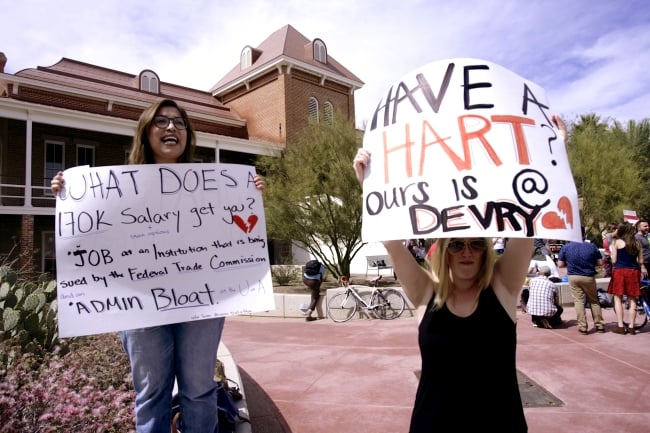You have /5 articles left.
Sign up for a free account or log in.

Students at the University of Arizona protest their president's service on the DeVry board.
Sam Gross/The Daily Wildcat
In their day jobs, Ann Weaver Hart and Linda Katehi earn hundreds of thousands of dollars a year.
As the president of the University of Arizona, Hart makes $665,000. As the chancellor of the University of California at Davis, Katehi makes $424,360. Like most leaders of public colleges, they are some of the highest-paid public officials in their states.
In February, they both accepted second jobs: as board members of DeVry Education Group, a for-profit education company, for which they would earn an extra $70,000 a year -- plus $100,000 in stock.
Within days, California critics were calling for Katehi to give up her board seat, while others called for her to resign from her position at UC Davis.
DeVry, a for-profit university, is facing allegations from the Federal Trade Commission, which claims that the company made false claims about its job placement rates and its graduates’ earnings. By serving on DeVry’s board, critics say, public university presidents legitimize its practices.
“No public university representative should be sitting the board of a company that is still mired in scandal,” said Carmen Balber, executive director of Consumer Watchdog, a group that co-wrote an open letter asking Katehi to step down.
But Katehi’s story goes beyond DeVry: she had also served on the board of the textbook publisher John Wiley & Sons, which critics believe constitutes a conflict of interest.
When the second board membership came to light, California Assembly Member Kevin McCarty called for legislative hearings.
“It is unseemly,” he said in a statement, “for the chancellor to be moonlighting side deals to fatten her bank account, especially when it runs contrary to the interests of our students.”
Nearly one-third of public college presidents serve on corporate boards. Most of those companies exist in far-flung industries, and the issues at play are different: Why should college presidents involve themselves with shipping, with search engines, with banking?
On these kinds of boards, presidents say that they can apply their knowledge of complex organizations and make connections that will help their institutions.
But for-profit education companies come with all sorts of ethical quandaries, critics say. If public universities exist to serve students, why should public university presidents associate with a company accused of exploiting those students? If presidents work to serve their universities, why should they help a competitor? While many for-profit colleges don’t compete for students with the University of Arizona or the University of California, for-profits and nonprofits compete for public dollars for student aid -- and they don’t always agree on matters of public policy.
Days after her appointment was announced, Katehi resigned from the DeVry board. She had believed she could help DeVry, she said in an apology, but accepting the position was a mistake. She plans to donate the money she made from her Wiley stock to a scholarship fund.
Approval and Disclosure
But in Arizona, Hart stayed firm. While she had accepted the DeVry position on the same day as Katehi, at first she faced only mild criticism -- a fractured Faculty Senate, a petition with just under 300 signatures. The Board of Regents stood by her, and faculty reaction was split.
What is it, critics wondered, that’s different about Arizona?
In a nutshell: Katehi didn’t follow regulations. In California, college presidents are required to go through a multistep approval process to serve on outside boards, and Katehi hadn’t received permission to accept the appointment.
In Arizona, university presidents only need to file disclosure statements about their appointments. According to Board of Regents President Eileen Klein, Hart complied.
“Our model is very different in Arizona,” Klein said. “Our presidents are the point of accountability for our universities.”
Yet some critics say that accountability isn’t enough and there needs to be a procedure in place to make sure presidents are only joining boards where appropriate. “The University of Arizona is trying to move into online education,” said Jake Harwood, the Arizona professor who started the petition. “DeVry is sort of a competitor of ours.”
Last week, a group of 21 state legislators wrote a letter to the Arizona Daily Star, criticizing Hart’s decision to keep her appointment.
“In light of her decision not to resign her position on the DeVry University board,” they wrote, “we now ask Dr. Ann Weaver Hart to step down as president of the University of Arizona.”
For some, the allegations against DeVry just make a bad situation worse. Even if DeVry were not under investigation, critics argue that Hart can’t serve two competing universities at the same time.
“It’s a little bit like if the president of General Motors served on the board of Kia,” Harwood said. “You wouldn't expect to see that, right?”
Hart’s supporters disagree. They argue that nonprofit and for-profit colleges serve different functions, existing in different sectors of the education industry. “Our students and DeVry’s students are not the same group,” said Arizona spokesman Chris Sigurdson. “DeVry and the University of Arizona don’t compete.”
But DeVry is still a university; it’s not a company from an unrelated sphere asking for guidance, the Daily Star wrote in an editorial Saturday. “The fact that a university president does not have to secure permission from the regents before taking a paid position at another university is a loophole the regents need to close.”
Raymond D. Cotton, a lawyer who specializes in presidential contracts, thinks presidents should need to ask for approval before joining boards, and the process should be outlined in their contract. Later, if a president is criticized for joining a board, she can say that she’s followed the protocol.
“In every contract I do,” Cotton said, “every single one, I recommend a process for prior approval -- not just disclosure.”
Klein believes in transparency, but she sees excessive regulations as counterproductive. California’s policy laying out the rules for leaders’ side jobs totals 10 pages; Arizona’s policy is three pages.
“To me, information is much more important than regulation,” she said. “More rules doesn’t get us where we want be in terms of accountability.”
A Public Debate
In California, Katehi began the oversight hearing with an apology.
“I resigned before I had the opportunity to act as a board member, and I received no compensation,” she said. “I also wanted to state unequivocally that this will not happen again.”
She said that she had good intentions when she decided to join the two boards. For-profits provide an important service, she said, which is why she accepted the DeVry position. On the Wiley board, she said, she could help advocate for open-access resources.
But critics in the room had trouble accepting her explanations. Why would Wiley appoint someone to its board who would push for lower prices? Even if Katehi could help DeVry, how could her board service help UC Davis?
“It was for the money; she did it for the money,” said Ed Howard, senior counsel at the University of San Diego’s Center for Public Interest Law.
And if she had joined to push for cheaper textbooks, he added, “then shareholders at Wiley and Sons should be very upset.”
It’s unclear how the Legislature could act, but the hearing could signal a willingness to change. Already, the University of California regents have called for a full review of their policy.
“To the best of my knowledge, this is the first hearing by a state Legislature on the issue of a president serving on corporate boards,” said Jim Finkelstein, a George Mason University professor who has been researching corporate board service since the ’90s.
At the hearing, Finkelstein presented his 2010 findings, which examined presidents at 134 public and private colleges and universities. On average, presidents serving on corporate boards made $148,000 per year per board, and they spent 12 days per year in board and committee meetings.
But among for-profit higher education companies, very few have current presidents on their boards.
“This is an industry under scrutiny; it’s an industry that’s had lots of bad actors,” Finkelstein said in an interview. “I can’t imagine a president of any university knowingly joining a board of a company that is actively under investigation.”








